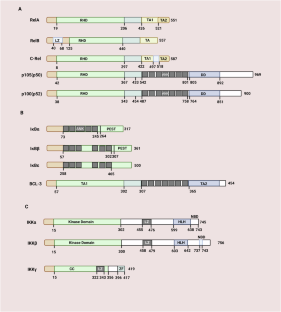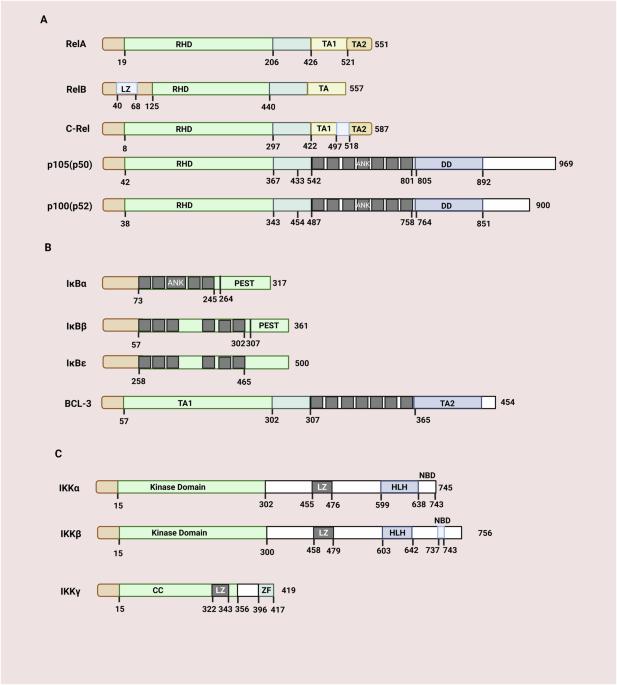NF-κB role on tumor proliferation, migration, invasion and immune escape
IF 4.8
3区 医学
Q1 BIOTECHNOLOGY & APPLIED MICROBIOLOGY
引用次数: 0
Abstract
Nuclear factor kappa-B (NF-κB) is a nuclear transcription factor that plays a key factor in promoting inflammation, which can lead to the development of cancer in a long-lasting inflammatory environment. The activation of NF-κB is essential in the initial phases of tumor development and progression, occurring in both pre-malignant cells and cells in the microenvironment such as phagocytes, T cells, and B cells. In addition to stimulating angiogenesis, inhibiting apoptosis, and promoting the growth of tumor cells, NF-κB activation also causes the epithelial–mesenchymal transition, and tumor immune evasion. Therapeutic strategies that focus on immune checkpoint molecules have revolutionized cancer treatment by enabling the immune system to activate immunological responses against tumor cells. This review focused on understanding the NF-κB signaling pathway in the context of cancer.


NF-κB 在肿瘤增殖、迁移、侵袭和免疫逃逸中的作用。
核因子卡巴-B(NF-κB)是一种核转录因子,是促进炎症的关键因素,在长期炎症环境中会导致癌症的发生。NF-κB 的活化在肿瘤发生和发展的初期阶段至关重要,在恶性肿瘤前期细胞和微环境中的细胞(如吞噬细胞、T 细胞和 B 细胞)中都会发生。除了刺激血管生成、抑制细胞凋亡和促进肿瘤细胞生长外,NF-κB 激活还会导致上皮-间质转化和肿瘤免疫逃避。以免疫检查点分子为重点的治疗策略使免疫系统能够激活针对肿瘤细胞的免疫反应,从而彻底改变了癌症治疗。这篇综述的重点是了解癌症背景下的 NF-κB 信号通路。
本文章由计算机程序翻译,如有差异,请以英文原文为准。
求助全文
约1分钟内获得全文
求助全文
来源期刊

Cancer gene therapy
医学-生物工程与应用微生物
CiteScore
10.20
自引率
0.00%
发文量
150
审稿时长
4-8 weeks
期刊介绍:
Cancer Gene Therapy is the essential gene and cellular therapy resource for cancer researchers and clinicians, keeping readers up to date with the latest developments in gene and cellular therapies for cancer. The journal publishes original laboratory and clinical research papers, case reports and review articles. Publication topics include RNAi approaches, drug resistance, hematopoietic progenitor cell gene transfer, cancer stem cells, cellular therapies, homologous recombination, ribozyme technology, antisense technology, tumor immunotherapy and tumor suppressors, translational research, cancer therapy, gene delivery systems (viral and non-viral), anti-gene therapy (antisense, siRNA & ribozymes), apoptosis; mechanisms and therapies, vaccine development, immunology and immunotherapy, DNA synthesis and repair.
Cancer Gene Therapy publishes the results of laboratory investigations, preclinical studies, and clinical trials in the field of gene transfer/gene therapy and cellular therapies as applied to cancer research. Types of articles published include original research articles; case reports; brief communications; review articles in the main fields of drug resistance/sensitivity, gene therapy, cellular therapy, tumor suppressor and anti-oncogene therapy, cytokine/tumor immunotherapy, etc.; industry perspectives; and letters to the editor.
 求助内容:
求助内容: 应助结果提醒方式:
应助结果提醒方式:


